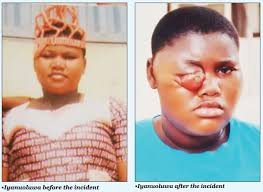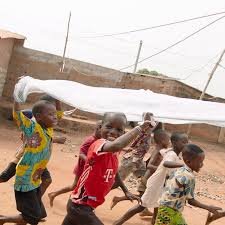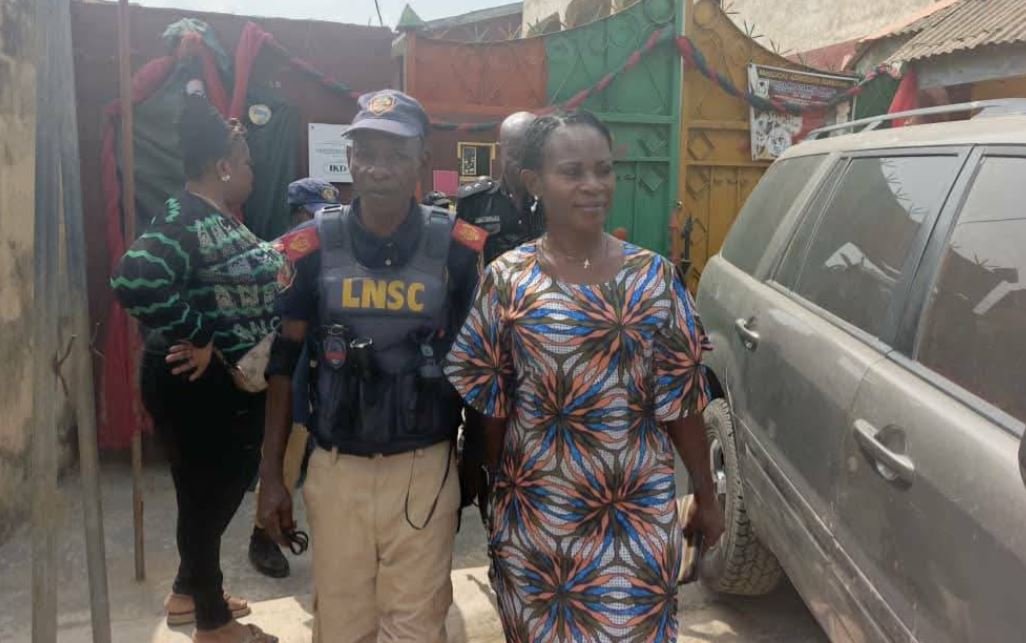It is now an open secret that children are vulnerable in many of the centres and homes where parents take them for care while they go for work or business. These children are meted with fatal corporal punishment in one hundred ways. Unfortunately, this is trending in majority of Nigerian schools, causing lasting harm to students’ physical, emotional, and psychological well-being.
A recent and harrowing case from Christ-Mitots School in Ikorodu, Lagos, has brought this issue back into the public eye. On January 6, 2025, a viral video surfaced showing a three-year-old pupil being repeatedly slapped across the face by his teacher, Stella Nwadigo, leaving the child visibly trembling. The incident, which occurred in the classroom over the child’s failure to quickly grasp a lesson on writing numbers, sparked widespread outrage and underscored the dangers of corporal punishment in Nigerian education. Gom Mirian narrates.
The Painful Story of One Child
For Mrs. Adenike Okunlaya, a widowed mother and teacher, the video of her son’s abuse hit hard, not only because of the trauma her child experienced but because she, too, is part of the education system. Reflecting on the incident, she recounts her shock at learning about her son’s ordeal.

“I was in my class when I heard my colleague shout, ‘Write six, write six,’” she recalls, her voice cracking. “Later, another teacher came to me with their phone and showed me the video. I couldn’t believe my eyes.”
In the video, the teacher repeatedly slaps the boy, leaving him visibly shaken and crying. Mrs. Okunlaya’s son, whose name is withheld for privacy and protection reasons, was taken to the Ikorodu General Hospital, where doctors confirmed that his ear had been damaged from the force of the slaps. “They referred us for further tests, and the medical report is now with the police,” she explains.

The emotional toll is undeniable for the mother, as she struggles to come to terms with the violence her young child endured. “He’s just three years old. How could anyone do this to him?” she says, her voice filled with anguish. “It hurts me to know that this could happen to my son, in a place that is supposed to be safe for him.”
A Pattern of Tragedy
Sadly, this incident is not an isolated case. Fatal and severe corporal punishment in Nigerian schools has become an increasingly prevalent issue.

Flogged by his teacher in Lagos
On May 21, 2024, Faith Nwonye, a 30-year-old teacher from Anambra State, was arrested after allegedly beating an eight-year-old pupil into a coma. The child, whose chances of survival were reduced to just 20% as disclosed by the doctor, was left fighting for his life, all due to a minor classroom infraction.

Further tragedies occurred later in the year. In October 2024, a high school student from Obada Idi-Emi High School in Ogun State died after enduring a series of extreme punishments. Monday Ariyo, the student, was forced to do 162 frog jumps and received 24 strokes of the cane for breaking a dustbin. This excessive punishment, far out of proportion to the crime, left the boy with fatal injuries.
A year earlier, in 2023, Marwanu Nuhu Sambo, a Junior Secondary School student in Kaduna, died after being beaten by the school’s principal and vice-principal due to his repeated absences.
In February 2022, a teacher in Asaba, Delta State, beat a one-year-seven-month-old pupil to death for playing with water in the classroom.
These cases, marked by physical and fatal consequences, reflect the normalization of corporal punishment within Nigeria’s education system. Despite these ongoing tragedies, governmental response has been limited, offering only temporary suspensions or school closures, without addressing the root cause.
The Child Rights Act and the State’s Inaction
The Nigerian Child Rights Act, designed to protect children from abuse, clearly prohibits such extreme forms of punishment. The Act states that every child is entitled to “respect for the dignity of his person,” and emphasises that no child should endure physical, mental, or emotional injury, maltreatment, or torture. Unfortunately, these protections are rarely upheld.
After each reported case of abuse, the typical response from authorities has been the suspension of the offending teachers and the temporary closure of the schools involved. However, these measures do little to address the larger issue of systemic violence in schools. Without comprehensive policy reform or long-term solutions, such incidents will continue to occur.

One of the most effective reforms being adopted in countries such as the United States, China, and Russia is the installation of surveillance cameras in classrooms and around school grounds. This measure has proven successful in reducing violence, bullying, and misconduct while ensuring a safer environment for both students and staff.
However, findings by the Africa Health Report (AHR) reveal that most schools in Nigeria, including those in Abuja, lack camera surveillance, leaving students vulnerable to abuse. This lack of safety reform is a significant barrier to creating a secure educational environment for children.
various studies put abuse in Nigerian schools between 70 per cent and as high as 85 per cent despite its prevalence, there is a glaring absence of school safety policies to address the issue directly in Nigeria.
Efforts to reach the Federal Ministry of Education for comment on the matter proved unfruitful, as spokesperson Folashade Birowo did not respond to calls or messages, indicating a concerning lack of urgency on the part of the government.
Expert Insights on the Issue
Dr. James Annai, a sociologist at Benue State University, highlights the deeper issues embedded within Nigerian society that contribute to the normalization of corporal punishment in schools. “The widespread acceptance of corporal punishment is a reflection of broader societal beliefs that discipline must be enforced through physical means,” he states.
Annai argues that this culture of violence not only harms children physically but also teaches them that violence is an acceptable way to solve problems. “It’s a vicious cycle that needs to be broken,” he says.
He further explains that while suspending individual teachers provides short-term relief, it does nothing to address the larger systemic issue. “What we need is comprehensive policy reform—clear national policies that explicitly protect children from physical punishment, teacher training on non-violent disciplinary methods, and the installation of cameras to monitor classroom activity,” Annai urges.
Parents Speak Out
For parents like Mrs. Nneka Chukwuma, the consequences of corporal punishment are devastating. She struggles to come to terms with the possibility that her child could have suffered permanent damage due to an educational system that continues to rely on violence. “I would rather have my child remain illiterate than see him return home deformed or sick because of punishment,” she says, using the Igbo phrase ‘Tufiyakwa,’ meaning ‘God forbid.’
Her concerns reflect a growing fear among parents about sending their children to schools where violence is normalized. “It breaks my heart,” she adds. “I can’t imagine sending my child to school, only for him to return home harmed or worse.”
For Mrs. Okunlaya, who is still helping her son recover from the trauma, the fight for justice is far from over. “I want justice for my son,” she said. “No child should have to go through what my son went through. If the government can’t protect our children in schools, then who will?”
A Call for Action
The tragic deaths and injuries of children in Nigerian schools serve as a painful reminder that the time for reform is long overdue. Despite the growing number of fatalities linked to corporal punishment, the government has failed to implement lasting solutions.
With corporal punishment still widespread in Nigerian schools, it is crucial that authorities move beyond temporary measures and implement comprehensive policies that will protect children’s rights and ensure their safety. These policies should include installing surveillance cameras in schools, training teachers on non-violent discipline, and creating a robust national framework for school safety.
The children of Nigeria deserve better. They deserve an education system that values their safety, dignity, and well-being. As the calls for reform grow louder, it is time for the government to act decisively and break the cycle of violence that continues to harm the nation’s most vulnerable citizens.



